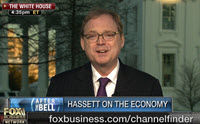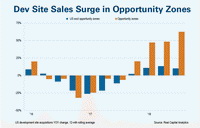Nearly a month into the partial government shutdown, the impasse over funding of a border wall on the Mexican border continues with no sign that an agreement between President Trump and Congress is near. (Axios, Jan. 16
 |
White House Council of Economic Advisers Chairman Kevin Hassett this week doubled the estimate of how the government's partial shutdown is reducing economic growth. The initial cost to the economy, estimated at 0.1 percentage point in growth every two weeks, was revised to 0.13 percentage point every week. ( Fox interview , Jan. 15 /Forbes, Jan. 16 / Vox, Jan. 18 ) |
 |
The Fed' s " beige book " shows a generally positive picture for the U.S. economy but reveals an undercurrent of worry. (WSJ, Jan. 16) |
The Fed's Open Market Committee will meet next on Jan. 29-30, the same time as The Roundtable's State of the Industry Meeting in Washington.
The government shutdown is slowing progress on tax guidance important to real estate, including Opportunity Zone incentives. The IRS cancelled a Jan. 10 administrative hearing on the October proposed regulations. However, under a special two-year IRS appropriation for tax reform implementation, and the agency’s own contingency plan, background work continues on Opportunity Zone rules and other critical regulatory guidance.”
 |
The Wall Street Journal reported on Jan. 15 that “there has been a surge in site acquisitions in the zones last year as developers planned for a surge of investments. There were 58% more deals [in] the zones in the third quarter of 2018, compared with the same quarter in 2017.” (WSJ, Jan. 15 and Real Capital Analytics.) |
The future of the OZ program will be discussed by Sen. Tim Scott (R-SC) – who led the effort in Congress for enactment of the opportunity zone program – and Roundtable member Geordy Johnson (CEO, Johnson Development Associates, Inc.) on Jan. 29 during The Roundtable’s State of the Industry Meeting in Washington, DC. Opportunity Zones will also be a focus of The Roundtable’s TPAC meeting on Jan. 30.
With Democrats now in control of the House of Representatives, key congressional committee chairs this week announced their policy agendas and appointed additional members. (Roundtable Weekly, Jan. 11)
House Financial Service Committee:
- Rep. Maxine Waters (D-CA), the new chair of the powerful House Financial Services Committee, on Wednesday outlined a broad range of priorities that include policy issues affecting commercial real estate. In her first speech as committee chairwoman, Waters said, “Some of the big issues we are going to try to work on a bipartisan basis include long-term reauthorization and reform of the National Flood Insurance Program (NFIP), Terrorism Risk Insurance (TRIA), and the reauthorization of the job-creating Export-Import Bank.” (House Financial Committee Services, Jan. 16)
Rep. Maxine Waters (D-CA), the new chair of the powerful House Financial Services Committee , outlined a broad range of priorities that include policy issues affecting commercial real estate.
[The Terrorism Risk Insurance Act, enacted following 9/11 and extended three times since 2002, is currently scheduled to sunset at the end of 2020. A long-term extension of TRIA is a major policy focus of The Real Estate Roundtable. Terrorism risk insurance coverage is essential for many businesses – including commercial real estate. Without TRIA, private markets cannot provide the American economy with the coverage it needs. The Roundtable also supports a long-term reauthorization of NFIP and improvements to the program that would expand private markets.]
- Chairwoman Waters addressed a broad range of other financial policy priorities, including regulatory oversight of Wall Street; the future of the government sponsored enterprises Fannie Mae and Freddie Mac; diversity in the workplace; and housing affordability.
[A Federal Reserve report released this week addresses how student debt hinders homebuying for young adults and the role it plays on their decisions to live in rural or urban areas (Wall Street Journal and CNBC, Jan. 16). “Over 20 percent of the overall decline in homeownership among the young can be attributed to the rise in student loan debt. This represents over 400,000 young individuals who would have owned a home in 2014 had it not been for the rise in debt,” according to the report. “As policymakers evaluate ways to aid student borrowers, they may wish to consider policies that reduce the cost of tuition …” (Federal Reserve, Consumer & Community Context, Jan. 2019) ]
- Chairwoman Waters also announced 16 new Democratic appointees to the financial services committee, including eight who are members of the Congressional Progressive Caucus. The new committee members include Reps. Alexandria Ocasio-Cortez (D-NY), Katie Porter (D-CA), Ayanna Pressley (D-MA), and Rashida Tlaib (D-MI). (House Financial Services Committee, Jan. 16 and Vox, Jan. 17)
- Waters added in her Wednesday speech, “As Chairwoman I will continue to find areas where we can all work together. Ranking Member McHenry and I have a relationship, and just last Congress we worked together on several bills … So I am very hopeful that we will be able to get some good bipartisan work done in Committee.” (House Financial Services Committee, Jan. 16) Rep. Patrick McHenry (R-NC), the House GOP’s former chief deputy whip, is now the committee’s ranking member.
- House Financial Services member Rep. J. French Hill (R-AR) will address a joint Real Estate Capital Policy Advisory Committee and Research Committee (RECPAC) meeting on the morning of Jan. 29, before the start of the Roundtable’s State of the Industry business meeting.
House Ways and Means Committee:
- New House Ways and Means Committee Chairman Richard Neal (D-MA) announced this week the committee's membership and new chairs for its subcommittees for the 116th Congress. (Ways and Means, Jan. 16)
New House Ways and Means Committee Chairman Richard Neal (D-MA) announced the committee's membership and new chairs for its subcommittees for the 116th Congress. (Ways and Means, Jan. 16)
- Chairman Neal this week also invited Treasury Secretary Steven Mnuchin to testify at the Ways and Means Committee’s first hearing on Jan. 24 on the government shutdown’s impact on Treasury and American taxpayers. Earlier in the week, the Treasury Department released a 132-page shutdown contingency plan for the IRS for the tax-filing season and a brief update for taxpayers on its overall operations.
- Treasury deputy assistant secretary Jennifer Bang responded to Neal’s invitation by offering other officials to testify. “If the purpose of the upcoming hearing is to inform Congress and the public, we are confident that goal will be best served by testimony from the senior Department officials with the deepest and broadest expertise on the subject of the hearing,” (The Hill, Jan. 17)
- Yesterday, Neal urged Mnuchin to reconsider the request, noting that Mnuchin's trip to Davos, Switzerland for the annual World Economic Forum next week has been cancelled. “With more than 70,000 Treasury employees furloughed and missing paychecks, I strongly believe Secretary Mnuchin himself should appear before our committee and answer members’ questions. Nearly a month into the shutdown and with tax filing season rapidly approaching, the Treasury Department has announced plans to call more than 35,000 employees back to work, but has not provided details about this action to our committee,” Neal stated. (House Ways and Means News Release, Jan. 17)
Chairman Neal – the long-standing co-chair of the House Real Estate Caucus – will discuss prospects for tax policy legislation with Roundtable Board Member John Fish (Chairman and CEO, SUFFOLK) during The Roundtable’s State of The Industry Meeting on Jan. 29 in Washington, DC.